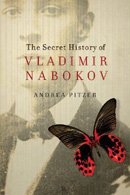A startling look at Nabokov's life and works—notably Pale Fire and Lolita—delivering new insights into one of the twentieth century's most enigmatic authors.
Novelist Vladimir Nabokov witnessed the horrors of his century, escaping Revolutionary Russia then Germany under Hitler, and fleeing France with his Jewish wife and son just weeks before Paris fell to the Nazis. He repeatedly faced accusations of turning a blind eye to human suffering to write artful tales of depravity. But what if Nabokov was up to far more than readers ever imagined?
Using information from newly declassified intelligence files and recovered military history, author Andrea Pitzer argues that far from being a single-minded advocate of art for art's sake, Vladimir Nabokov managed to hide disturbing history in his fiction.
Seen through this lens, Nabokov emerges as a documentary conjurer, spending the most productive decades of his career recording a saga of forgotten concentration camps and searing bigotry. From Tsarist courts to Nazi film sets, from CIA front organizations to wartime Casablanca, the story of Nabokov's family is the story of his century—and both are woven inextricably into his fiction.
The Secret History of Vladimir Nabokov is published by Pegasus Books and distributed by W.W. Norton. Twenty percent of the author's post-publication proceeds will be donated to organizations devoted to the study of Nabokov's life and works, as well as institutions preserving Gulag and Holocaust history. Watch the home page for posts about which groups will be receiving funds, with a description of how readers can make additional contributions if they wish. In the meantime, for more information, email Andrea Pitzer.
Reviews
Here are a few of the things critics are saying about The Secret History:
"[Pitzer] has done much exemplary primary research, and this book forces one to consider several fascinating quandaries presented by Lolita and Pale Fire."
— The New York Review of Books
"Pitzer, like Nabokov, is a beautiful writer and gimlet-eyed observer, especially about her subject..."
— The Boston Globe
"Pitzer [shows], history—if not politics—was never far from Nabokov’s considerations."
— The New Republic
"Without question, the horrors of the 20th century have always rumbled beneath the surface of Nabokov’s novels, and Pitzer’s new book is a fine guide to their nightmarish underbelly."
— Minneapolis Star Tribune
"Pitzer’s research here is astounding."
— The Brooklyn Rail
"Pitzer accomplishes her goal of revealing the indirect appearance of Nabokov’s biography in his most celebrated fiction. Highly recommended for all Nabokov fans who as a result of reading this will probably wish to reread the works analyzed here."
— Library Journal
"A seminal work of painstaking research and scholarship..."
— Midwest Book Review

